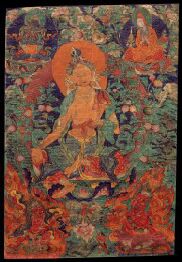The following is an excerpt from a teaching by Jetsunma Ahkon Lhamo called “The Bodhisattva Ideal”
Our consciousness sees everything as being solid. And it’s so odd, isn’t it, because seven years ago we were completely different. If you think about what you looked like ten years ago, twenty years ago… Don’t take my word for it, bring out the pictures. You look completely different. I look completely different. I’m sure you do also. So even though we have a sense of self-nature being inherently real and solid and very permanent, still we are this very impermanent condition that thinks of itself only in a certain regard. But when we first meet with the path we are taught that all things are impermanent and we are led to a study of that.
The study should look like this. We understand in this way: When we are born, we are born drawing on the karma of our previous existences, and that scenario is catalyzed by the environment around us. Whatever karmic potentials are within our mindstream are then ripened and matured and brought forward due to certain catalytic events in our environment. Then beyond that, we continue to habituate ourselves. We have certain propensities due to our karmic flavor, if you will. These certain propensities look like habitual tendencies and they are, in fact, habitual tendencies. One person may have a great habit toward generosity and look for ways to engineer their life going on the track of generosity, compassion. Another person may have the habit of self-absorption and angerand regard only their own feelings, not taking into account the feelings of others in the environment, being very self-absorbed and wishing that others would help them, would be of benefit to them. That kind of selfishness becomes, then, a deep habit and very difficult to break. So another person may have that kind of habit.
Unfortunately there are sentient beings with many different kinds of karma. One may have had the habit pattern through many lifetimes of creating this habitual tendency of harming others, or hurting others, or killing others. The kinds of animals that are, by their type, predators, are actually beings who have within them the habitual tendency of killing, and they manifest as predators due to that habitual tendency. So we come in with certain kinds of habits, and then we tend to reinforce them throughout the course of our lives.
According to this teaching that the Buddha has given us about impermanence, we understand that there is nothing, not one thing, that we can accomplish or accumulate during the course of our lifetime that we can take with us at the time of our death. Meaning this: Let’s say that we accumulate a great deal of money. Let’s say that in the past we have been very generous to others and so we have the karma of being able to manifest money fairly easily. Many people do. It’s that simple. It’s due to having been generous in the past. This element of money coming into one’s life is like greased lightning. It just really comes in very easily.
So, if that’s the case, then let’s say during this lifetime we spend a great deal of time making a lot of money and yet, even though we had the habit of being very generous in the past, somehow the impact of receiving so much money in this lifetime is a shock.. It reminds me of the story about the man who is making lots of money with computers these days. He came from nowhere, Mr. Computer Geek, and then suddenly he’s a multi-billionaire. It seems, from everything that I have read about him, that he is shocked and he just doesn’t get it. To have several billion dollars that you can get your hands on if you really need to, and then to think that you need to make more before you can be generous is really an unusual way to think. I mean how many billions can you spend in one lifetime?
So for somebody like that, obviously he was very kind and generous in the past, but here he has been hit with this amazing shock of money just flying into his pocket. Now he is in danger of making the mistake of spending his energy and his opportunity increasing that money without increasing the generosity, and therefore in the future he will not have the same results, because none of that money that he’s making now is going to go with him. This is the Buddha’s teaching, that we cannot take even one sesame seed’s worth of our accumulated wealth with us when we go into the bardo.
But, according to the Buddha’s teachings also, supposing we were to make the choice of being extraordinarily generous and using our wealth to make the world a better place, to benefit others, to support others who are in need, that sort of thing. Then we can take this habitual tendency of generosity, this karmic potential,. with us into the next life by virtue of the fact that we have given so much to others and been so kind and generous, because it isn’t measurable like a sesame seed. It is the karma of one’s mindstream. It is the habitual tendency of our consciousness, and that does go into the next life. These are the Buddha’s teachings: We actually have the opportunity to create benefit in this life that does last into the next life; but it’s nothing material, nothing that we can ever create in samsara, that will go with us. Nothing that has weight, size, dimension. Nothing we can hold. Nothing material. Only the habits of our mind. So these are the teachings that we receive when we first come to Dharma.
Copyright © Jetsunma Ahkon Lhamo. All rights reserved

